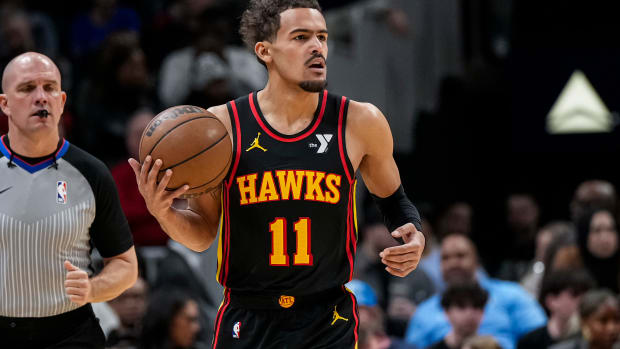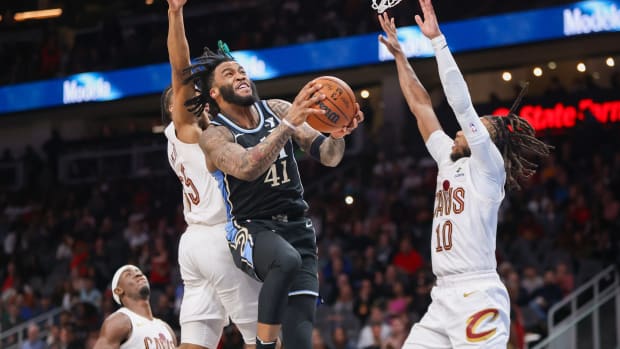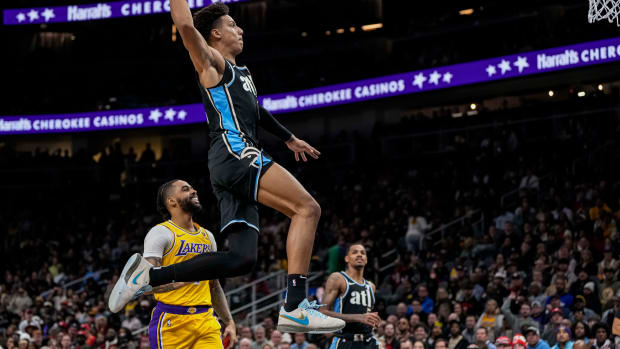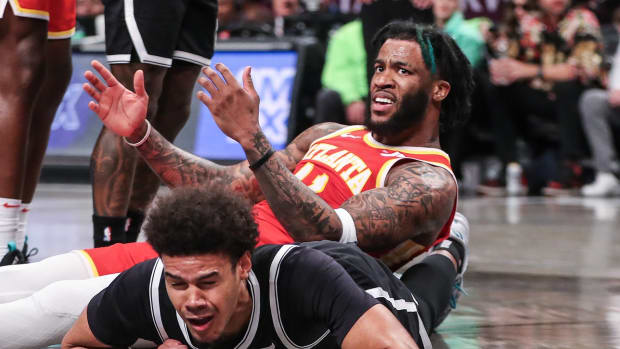With 2021 Playoff Aspirations, the Hawks Face A Pivotal Offseason
Whether the NBA season continues or not, nothing about the outcome for the Hawks will materially change before the offseason begins. Atlanta will finish near the bottom of the Eastern Conference standings, with a (likely) high lottery pick and over $49 million in cap space to spend in pursuit of improving the team entering the 2020-21 season. Lloyd Pierce provided a tangible goal for his team and exciting fodder for fans when he resolutely discussed making the 2021 playoffs, but he also drew a clear line between success and disappointment.
With Trae Young ascending into stardom and growing restless over the team’s lack of success, Pierce and Travis Schlenk will feel more pressure than ever to produce immediate on-court results -- which hinges on a successful offseason. Unless the rest of its young players take significant steps next year, the Hawks likely won’t make the postseason without meaningful roster additions. Inexperienced teams struggle to win in the NBA, and Atlanta won’t have the depth to sustain regular-season success without at least one key free-agent acquisition or trade. Travis Schlenk got out in front of one positional need by acquiring two centers -- both of whom are above-average defenders -- at the trade deadline, but the Hawks still have several needs worth addressing.
Schlenk’s failure to target those needs last summer contributed heavily to Atlanta’s season flying off the rails. The Hawks neglected to acquire a backup point guard or a starting-caliber center, which put them at a massive disadvantage before the season even began. By the end of the year, they ranked 26th in offensive efficiency, 28th in defensive efficiency, and 28th in net rating, with no one outside of Young to provide direction on either end of the floor. Atlanta was outscored by 13.3 points per 100 possessions with its point guard off the floor this season, scoring under a point per possession when Young went to the bench. Jeff Teague eventually helped steady second units late in the season, but the Hawks might find a better option at backup point guard on the open market (Teague will also be a free agent, and has expressed a desire to remain in Atlanta).
Their biggest priority, however, should be shooting -- preferably on the wing. Atlanta ranked last in the NBA in 3-point percentage this season despite generating nearly 37 percent of its shots from beyond the arc, and as a result had little room for Young to operate on offense. While the 2020 free agent class isn’t particularly strong at the top, it has plenty of rotation-caliber players, and the Hawks have more cap space to spend than any team in the league. Dedmon and Capela will help lift Atlanta’s defense from the absolute depths of the league, but the Hawks could still use more defensive talent in the backcourt to shore up the point of attack and balance out Young’s inefficacy on that side of the ball.
The ideal target would be able to defend both guard positions, space the floor, and initiate offense, but the NBA doesn’t exactly abound with those players. Kevin Huerter may well be on his way to filling those job requirements, though his defense hasn’t become that kind of weapon yet. Shooters like Joe Harris, Dāvis Bertāns, and Tim Hardaway Jr. would provide a boost, while more limited wings like Tony Snell or Moe Harkless could help plug defensive holes at low costs without taking much off the table at the other end.
Rookies don’t often aid playoff chases, and this summer’s draft could prove unusually challenging to evaluate. Much like the upcoming free agent class, the 2020 Draft is widely regarded as underwhelming at the top -- where the Hawks will pick -- and doesn’t promise future stars in the same way the last two drafts did. That could make it difficult for a lottery team with immediate playoff aspirations to find a worthwhile pick in the top eight. Atlanta isn’t going to spend another year prioritizing youth development and gifting minutes to unready rookies, which would seem to augur an intent to draft a player capable of contributing right away. That player might not exist at the top of this year’s draft board.
With an All Star point guard and encouraging nucleus already in tow, the Hawks may be better served trading their pick (if it lands in the top five) for a lower first-round selection and a future pick or established rotation player. (Last month, The Athletic’s Chris Kirschner wrote that the Hawks consider the upcoming draft class a relatively weak one and explore this possibility. The situation will become far clearer once the draft order is set.) If the team truly prioritizes making the playoffs over developing another young player, it would make sense to add someone who would be useful in that pursuit.
The upcoming summer will be a pivotal one for Atlanta as it plans to accelerate its rebuild. The Hawks arguably have pieces that, if properly complemented, could feasibly form a playoff nucleus in 2021, but that will require them to strike the right moves in the offseason. Having made crucial missteps a summer ago, Atlanta can partially rectify those mistakes by learning from them this time around.




